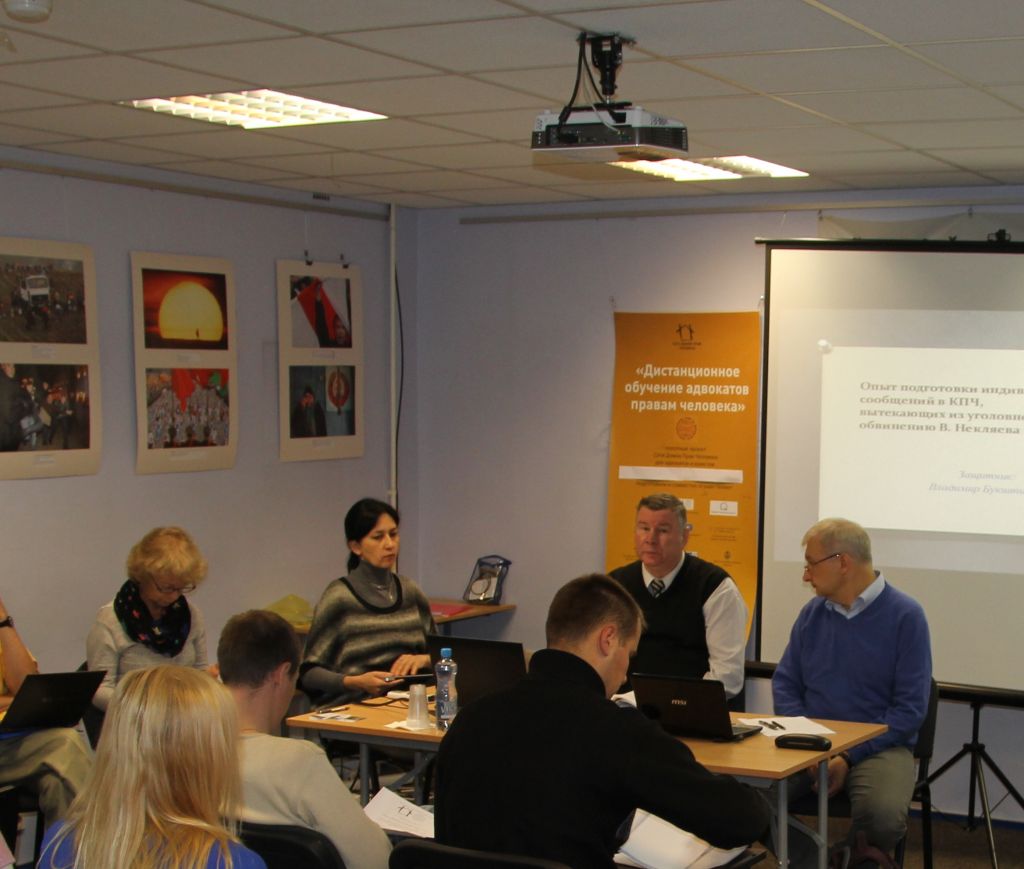On 28-29 September Vilnius held Regional Seminar for Belarusian graduates of “Electronic Human Rights Education for Lawyers” project. The Seminar was also attended by several of the graduates and participants of “Bring International Standards Home” project. The Seminar was dedicated to learning the procedures of appealing to the UN Committee on Human Rights. During the Seminar the participants made presentations of their projects and activities related to the protection of human rights and were able to discuss their experiences with their colleagues.Practical questions about the use of mechanisms of the UN HRC, including legal argumentation of complaints and the implementation of HRC resolutions were explained to the participants by experts – practising lawyers who have knowledge and experience in this area, as well as positive outcome of appeals. In particular, one of the experts was human rights defender and former lawyer Raman Kislyak, who participated in the preparation of 64 individual appeals: 63 to the UN Committee on Human Rights (5 of them were considered), and 1 to the UN Committee on the Elimination of Discrimination against Women (considered).
The participants also made presentations of their projects and activities related to the protection of human rights.”As a rule, educational activities (lectures, practical classes) are held during the seminars. However, the objectives of the program is not just training, but also facilitating of networking between participants, assisting in the development and implementation of their projects, the implementation of practical activities in the field of human rights protection. That is why the national team had the idea to give the participants the opportunity to present their work and their projects, to discuss the possibilities of cooperation and to exchange other information. The second day of the seminar was devoted to it, “- said the coordinator of the “International Law in Advocacy” program in Belarus Dzina Shautsova.
Former lawyers Tamara Sidarenka and Uladzimir Bukshtynau presented their work on the case of Uladzimir Niakliayeu – the candidate for president of the Republic of Belarus in the 2010 election, who was severely beaten during a march to the protest action, placed in the intensive care unit and then abducted by unknown men from there. Subsequently Niakliayeu was in the KGB jail and was charged with organizing mass riots. His lawyers would always get their requests for meetings with their client declined. “At the time I had worked as a lawyer for 16 years, and had 21 year of experience working in the prosecutor’s office prior to the work in legal profession but I had never encountered such disregard for the legal and moral norms, it was a “legal Chernobyl” – commented on the difficulties of working with the case Uladzimir Bukshtynau.
Uladzimir Bukshtynau sent to the UN Committee on Human Rights 2 complaints on torture, discrimination and violation of the right to protection in regard to Uladzimir Niakliayeu. Uladzimir Bukshtynau admitted to his colleagues that before the case he have not considered appeals to the HRC as an effective measure of protecting human rights and therefore he had to learn on his own the procedure of writing complaints to international bodies. “Then I haven’t had important knowledge that I got in BISH afterwards, and it was a completely new experience,” – said Uladzimir Bukshtynau.
A former lawyer and human rights defender at present Tamara Sidarenka also spoke about the fact that after the mass arrests and the flow of administrative and criminal cases related to protests against the rigged presidential election of 2010 the idea emerged to create a repository for the collection of materials on human rights violations in Belarus.”After 19 December 2010 about 20 GB of the investigation files, 35.8 GB of photos and videos, and more than 9,000 multi-page documents were collected” – said Tamara Sidarenka in her presentation. The idea of such a database has been embodied in the creation of the Documentation Center “We Remember” – documents displaying violations of human rights in Belarus are collected there. Tamara Sidarenka urged her colleagues to put there materials that, in their opinion, should be preserved.
The participant of “De facto implementation of international obligations of the Republic of Belarus in the field of civil rights and freedoms” project Jan Guardian presented to his colleagues the project “Ease of Access” – the creation of an interactive platform for people with disabilities who wish to visit Belarus.Author of the project said that “Ease of Access” is a platform that will allow anyone who wants to quickly and easily contribute to creating the most accurate and up-to-date online maps with information about places (shops, pharmacies, entertainment centers, etc.) accessible to people with disabilities
***
The project “Bring International Standards Home. De facto implementation of international obligations of the Republic of Belarus in the field of civil rights and freedoms” is part of the Human Rights House Network’s program “International Law in Advocacy”. The project was developed by a team of lawyers and human rights defenders in 2005 and has since been carried out by partner organizations of the Human Rights House Foundation in collaboration with international and national experts.
The overall goal of the project is to strengthen the promotion, protection and enforcement of human rights under the rule of law through professional development of lawyers and human rights defenders, through training, networking and cooperation between them, as well as through building their conviction and practical skills in direct application of international human rights standards at the national level.
Related articles
Belarusian human rights defenders learned about the work of the Ombudsman in Ukraine
Belarusian human rights defenders in solidarity with the Voronezh Human Rights House
Justas Paleckis: the situation with human rights in Belarus remains of a great concern





